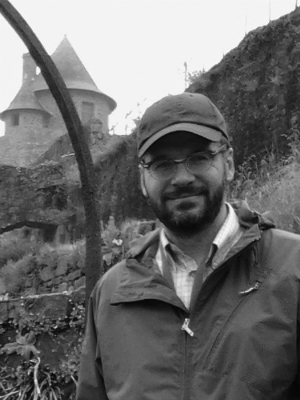World Travels and Bizarre Discoveries
History Professor Brady Brower Seeks the Strange in Social Sciences
 “I guess you could say that I’ve made it my life’s work to dig up weird and embarrassing things in the histories of the other social sciences,” said Weber State University assistant history professor Brady Brower.
“I guess you could say that I’ve made it my life’s work to dig up weird and embarrassing things in the histories of the other social sciences,” said Weber State University assistant history professor Brady Brower.
Brower’s research focus is French intellectual history and the history of the “human sciences” — psychology, sociology and other similar disciplines. His first book was about the relationship between 19th century French psychology and spiritualism. “Most of the big names in the early history of psychology spent at least some time holding hands with a medium in a darkened room,” he said.
Now, he is writing about how biological studies of insects, birds and other animal societies contributed to the early development of sociology in France. Brower is spending a fellowship year in Princeton, New Jersey, at the Institute for Advanced Study, where Albert Einstein spent his last 22 years. Brower is writing a book and interacting with scholars from all over the world. He said that knowing what is happening with the history profession at large makes him a better historian and helps him offer good advice to students pursuing academic careers.
One task Brower finds especially gratifying is to advise students writing grants to fund travel to distant archives. “WSU’s emphasis on undergraduate research gives our students an edge they wouldn’t find elsewhere,” he said.
From his experiences traveling and teaching, Brower — who has taught at WSU for seven years — has learned to appreciate the little things. One of his favorite things about teaching at WSU is the small class sizes. He can get to know all of his students, even the quiet ones, because he gets to read all of their exams and papers personally.
“At most institutions, class sizes are so large that the professors could never really get to know all of their students, and all of the grading has to be done by a teaching assistant,” Brower said.
Another thing he enjoys is that WSU is an open institution where students from modest backgrounds and at different stages in life can get ahead and succeed. He said, “I love that speech Bill Murray’s character gives at the beginning of the movie Rushmore. The basic message is to pursue success with a vengeance. We’ve had some incredible success stories in our department of students who have done exactly that.”
Brower expressed his admiration and gratitude for Susan Matt, chair of the history department. “She is one of the most capable professionals and accomplished scholars at WSU. Her example of what WSU can and should be has been tremendously influential in motivating me in my own work.”
When asked about his hobbies, Brower joked, “If the dean or provost asks, tell them I do nothing but read history, write books, attend conferences, prepare lectures, teach classes, grade exams, correct papers and hold office hours all day long.”
In reality, Brower said that he has “a sort of mania” for working with his hands. He thinks it started in high school when he worked summers as an auto mechanic at a local car dealership. Knowing how to keep old cars running was useful during the frugal years of college and graduate school. Now, he mostly works on bicycles or on his house and garden.
“I’m from the West. I grew up in a small town in southern Idaho more famous for producing potatoes than historians,” said Brower. “I’ve spent a lot of time living in other places in the United States and the world.”
Brower’s experiences at WSU continue to help him achieve his goals, and he’s come to appreciate how important his origins have been in shaping his perspective on things.
“At the very least,” he quipped, “I can never eat a non-Idaho potato without a certain amount of contempt.”